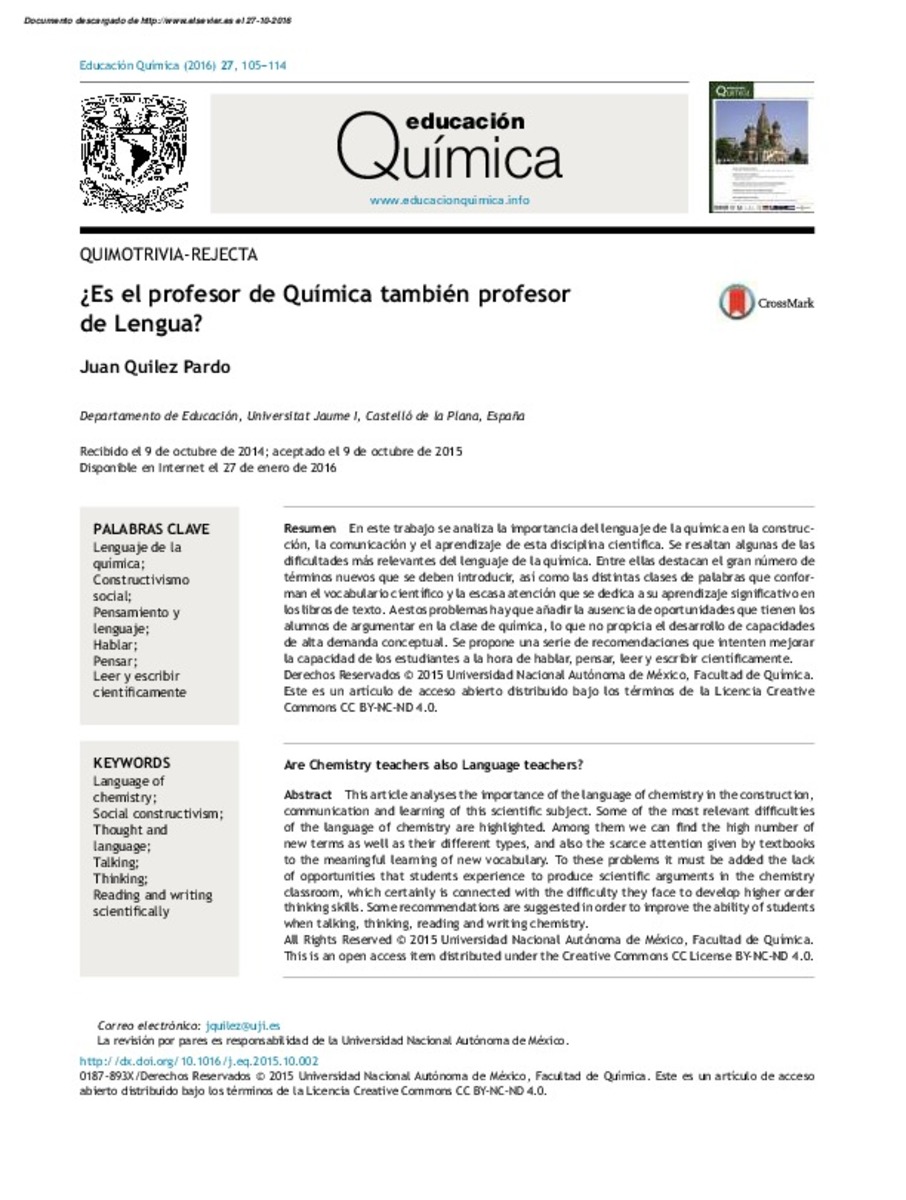Mostrar el registro sencillo del ítem
¿Es el profesor de química también profesor de Lengua?
| dc.contributor.author | Quílez, Juan | |
| dc.date.accessioned | 2016-10-27T16:57:18Z | |
| dc.date.available | 2016-10-27T16:57:18Z | |
| dc.date.issued | 2016 | |
| dc.identifier.citation | PARDO, Juan Quilez. ¿ Es el profesor de Química también profesor de Lengua?. Educación Química, 2016, vol. 27, no 2, p. 105-114. | ca_CA |
| dc.identifier.issn | 0187-893X | |
| dc.identifier.issn | 1870-8404 | |
| dc.identifier.uri | http://hdl.handle.net/10234/163906 | |
| dc.description.abstract | En este trabajo se analiza la importancia del lenguaje de la química en la construcción, la comunicación y el aprendizaje de esta disciplina científica. Se resaltan algunas de las dificultades más relevantes del lenguaje de la química. Entre ellas destacan el gran número de términos nuevos que se deben introducir, así como las distintas clases de palabras que conforman el vocabulario científico y la escasa atención que se dedica a su aprendizaje significativo en los libros de texto. A estos problemas hay que añadir la ausencia de oportunidades que tienen los alumnos de argumentar en la clase de química, lo que no propicia el desarrollo de capacidades de alta demanda conceptual. Se propone una serie de recomendaciones que intenten mejorar la capacidad de los estudiantes a la hora de hablar, pensar, leer y escribir científicamente. | ca_CA |
| dc.description.abstract | This article analyses the importance of the language of chemistry in the construction, communication and learning of this scientific subject. Some of the most relevant difficulties of the language of chemistry are highlighted. Among them we can find the high number of new terms as well as their different types, and also the scarce attention given by textbooks to the meaningful learning of new vocabulary. To these problems it must be added the lack of opportunities that students experience to produce scientific arguments in the chemistry classroom, which certainly is connected with the difficulty they face to develop higher order thinking skills. Some recommendations are suggested in order to improve the ability of students when talking, thinking, reading and writing chemistry. | ca_CA |
| dc.format.extent | 10 p. | ca_CA |
| dc.format.mimetype | application/pdf | ca_CA |
| dc.language.iso | spa | ca_CA |
| dc.publisher | Elsevier | ca_CA |
| dc.relation.isPartOf | Educación Química, 2016, vol. 27, no 2, p. 105-114. | ca_CA |
| dc.rights | Educación Química está distribuida bajo una licencia de Creative Commons Reconocimiento-NoComercial-SinObraDerivada 4.0 Internacional. © 2016, Elsevier España S.L. | ca_CA |
| dc.rights | Atribución-NoComercial-SinDerivadas 4.0 España | * |
| dc.rights.uri | http://creativecommons.org/licenses/by-nc-nd/4.0/ | * |
| dc.subject | Lenguaje de la química | ca_CA |
| dc.subject | Constructivismo social | ca_CA |
| dc.subject | Pensamiento y lenguaje | ca_CA |
| dc.subject | Hablar | ca_CA |
| dc.subject | Pensar | ca_CA |
| dc.subject | Leer y escribir científicamente | ca_CA |
| dc.subject | Language of chemistry | ca_CA |
| dc.subject | Social constructivism | ca_CA |
| dc.subject | Thought and language | ca_CA |
| dc.subject | Talking | ca_CA |
| dc.subject | Thinking | ca_CA |
| dc.subject | Reading and writing scientifically | ca_CA |
| dc.title | ¿Es el profesor de química también profesor de Lengua? | ca_CA |
| dc.type | info:eu-repo/semantics/article | ca_CA |
| dc.identifier.doi | http://dx.doi.org/10.1016/j.eq.2015.10.002 | |
| dc.rights.accessRights | info:eu-repo/semantics/openAccess | ca_CA |
| dc.relation.publisherVersion | http://www.elsevier.es/es-revista-educacion-quimica-78-articulo-es-el-profesor-quimica-tambien-S0187893X15000956 | ca_CA |
Ficheros en el ítem
Este ítem aparece en la(s) siguiente(s) colección(ones)
-
EDU_Articles [501]








